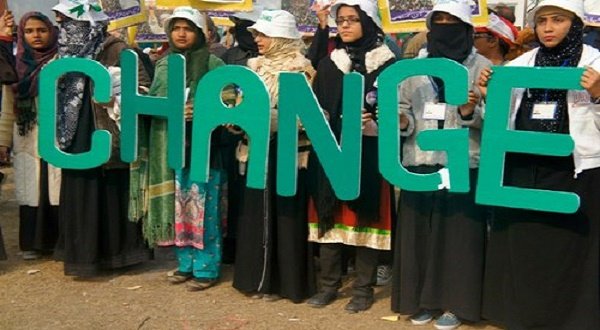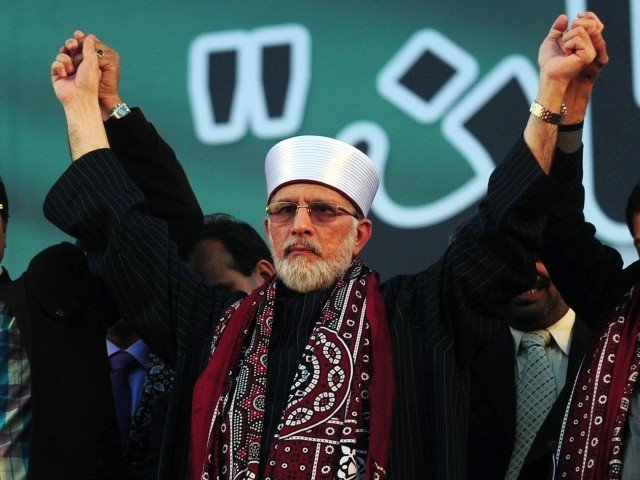
Long marches offer no shortcut to power. Both Imran Khan and Tahirul Qadri need to learn from Pakistan’s recent history
GEN (R) MIRZA ASLAM BEG
[dropcap]T[/dropcap]he phenomenon of “long march politics” in Pakistan has been witnessed during the regime of the elected governments since 1990. Basically, these have been exercised to bring about regime change, with the help of the army. The present halla-bulla by Imran Khan and Tahir-ul-Qadri is one such exercise to achieve their political ends. They have declared that Nawaz Sharif’s government will be ousted by end August and the revolution would set-in, for the “ultimate change.” Let us examine the previous long marches and the prospects of the current movement.
In 1992, Benazir Bhutto formed the National Democratic Alliance and marched towards Islamabad from Lahore. Her mother, Begum Nusrat Bhutto, led the march from Larkana, but both failed. Begum Nusrat Bhutto was treated shabbily. Bleeding and bruised, she was evacuated to the hospital and Benazir Bhutto was arrested and packed-off to Larkana, under house arrest. The long march failed because, the then Army Chief, General Asif Nawaz, “looked the other way”, while Nawaz Sharif had a free hand to wield his stick. And of course Benazir Bhutto had not done enough of “home work”, to ensure success.
The following year i.e. 1993, Benazir Bhutto planned another long march. By July 1993, she started the march and before she could reach Islamabad, the then COAS, General Abdul Waheed Kakar had already softened up the ground for her. He had intervened and was able to convince the president and prime minister to abdicate, with the promise “to hold fresh elections within 90 days.’ Benazir Bhutto called off the long march and prepared to win the elections by end 1993. Undoubtedly, she had done the home work, to ensure success.
I have the feeling that there may be a hidden politico-ideological agenda of the Qadri movement. What happened in Algeria and Egypt in the recent past, to replace political Islam with Secular Islam may well be the objective of the movement in Pakistan[divider]
In 1996, Nawaz Sharif became the prime minister, second time after Benazir Bhutto’s government was dismissed by President Sardar Farooq Ahmad Leghari, who was Benazir’s appointee and her seniormost party leader. Nawaz Sharif had hardly completed two years in office, when Benazir Bhutto formed the Grand Democratic Alliance in 1998, comprising Nawabzada’s eleven parties’ alliances; Awami National Party; MQM and Pakistan Tehrik-e-Insaf. She started the movement with blessings from Washington and the promise by the then COAS, General Pervez Musharraf that he will “take over from Nawaz Sharif, hold elections in ninety days, and will hand over the power.” This is where Benazir was cheated by the willy General, who didn’t hand over and himself ruled for the next ten years.
By 2009, the lawyers’ movement for the restoration of the judiciary had reached its climax but was making no headway. Nawaz Sharif, very cleverly took over the leadership of the lawyers’ movement, and started the long march from Lahore, threatening Islamabad. He had hardly crossed Ravi Bridge, when he got the message from the then COAS, General Ashfaq Pervez Kayani, that all his demands were met and he must call off his march. Nawaz Sharif obliged. Thus by helping the restoration of the judiciary, through this political maneuver, Nawaz Sharif gained a resounding political advantage, wining the 2013 elections, for the third time.
And now come August 2014. The Pakistani nation is feeling the threat of a revolution, by the maverick Tahir-ul-Qadri and the long march by Imran Khan. Both are threatening to remove Nawaz Sharif from his seat and take over the reins of the government. Imran Khan promises to take Pakistan to Utopian heights, if he formed the government. In fact, these are mere rhetorics, of the naive and the ambitious. Both haven’t done enough of “home-work” to ensure success.
Their fate may be the same, as of Benazir Bhutto’s long march of 1992, when she herself was packed off to Larkana and Begum Nusrat Bhutto, to the hospital, bruised and bleeding. Tahir-ul-Qadri already has got it on the knuckles, yesterday, in the hit-and-run battle, with the government. Now let us see what is there in store for Imran Khan on 13-14 August, encounters.
However, the developments of the last few days suggest that perhaps they are working on a ‘strategy of indirect approach to battle’ which means creating such chaotic conditions on the streets that the government will be forced to call up the army in aid of civil power. Imran Khan is already talking suggestively of “Army being called up to control the situation.”
As regards the revolution of Qadri, perhaps he himself does not realize the damaging effects of a revolution. In the recent past, the countries like Iran and Afghanistan could bear the shock of the revolution but others, such as Yugoslavia, Czechoslovakia, Iraq and Ukraine have split up. Because very much like Pakistan, they are all very fragile from within, as a nation, to sustain the shock of a revolution. Revolution is not an option for Pakistan. We have to adopt ways and means to bring about change, remaining within the norms of democracy, the Constitution and the rule of law.
I have the feeling that there may be a hidden politico-ideological agenda of the movement. What happened in Algeria and Egypt in the recent past, to replace political Islam with Secular Islam may well be the objective of the movement in Pakistan. To recall, Qadri last came to Pakistan in 2013 to forestall the elections, which Nawaz Sharif was sure to win, but withdrew after negotiations with PPP government. Even Imran Khan did not raise a finger against PPP government known for its bad governance. Surprisingly, both are now trying to dislodge Nawaz Sharif’s ‘right of the center government’, which is rather intriguing.
Pakistan’s ideology is sacrosanct as enshrined in the Constitution that “Pakistan is to be governed by a democratic system, based on the principle of Quran and Sunnah,” and that constitutes our National Purpose, which every Pakistani has to defend, for what he owes to the country.
_______________________________________________________________________
All opinions and views expressed in columns and blogs and comments by readers are those of individual writers and do not necessarily reflect the editorial policy of Caravan


